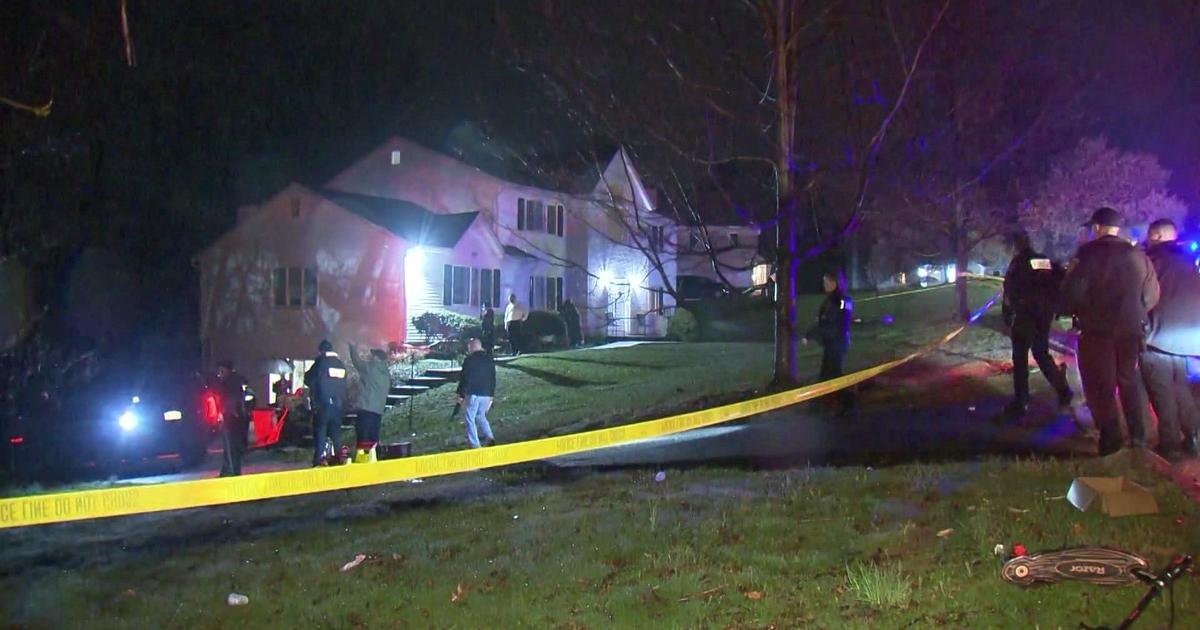CT Professor Was Translator For Moammar Gadhafi; NJ Mansion Still Libya's
DANBURY, CT (WCBS 880/AP) - No one in Libya was untouched by the tyranny of now late dictator Moammar Gadhafi, according to Dr. Abubaker Saad.
WCBS 880's Paul Murnane On The Story
Podcast
Saad is now a history professor at Western Connecticut State University.
He was working in the Libyan government when Gadhafi took power and stayed on for several years working as his interpreter until a failed coup and his escape to the west.
PHOTOS: Capture And Death Of Moammar Gadhafi (GRAPHIC) | Four Decades Of Moammar Gadhafi
What followed was a death sentence from the Libyan courts.
Gadhafi's control over government and cultural institutions was so complete, Saad says Libya now has to start from scratch.
He hopes civil war is not on the horizon, but says he's the happiest person in the world now that Gadhafi is gone.
WCBS 880's Levon Putney: What About His Crib In Jersey?
Podcast
The death of Moammar Gadhafi left a lingering question in northern New Jersey.
What happens to his Englewood mansion?
The gated estate with a charcoal colored home on East Palisde Avenue has a nice manicured lawn and you can see a children's playset in the backyard.
But there are no kids, no landscapers or anyone visible on the property.
It's technically owned by the country of Libya. So, nothing actually has to change.
This is the same home which caused an uproar two years ago when the now late Gadhafi wanted to pitch a tent in the front yard to stay there visiting for the United Nations General Assembly.
City manager Timothy Dacey told WCBS 880 reporter Levon Putney that a dignitary from Libya does stay there sometimes, but beyond that he does not know if the country plans to keep the home or sell it given Libya's current situation.
As far as Dacey can say, the north African country is still the property owner.
WCBS 880's Peter Haskell Follows The Oil Flow
Podcast
Meanwhile, it will still be several months before Libya can export as much oil as it did before it descended into civil war earlier this year. But the killing of Moammar Gadhafi reduces the chance that violence will get in the way as Libya cranks up production again.
As Libyan crude returns, it could lower the price of oil on the international markets and gasoline at American pumps.
The type of crude produced by Libya, known as light, sweet crude, is rare. It is especially valuable because it is easier for refineries to convert into diesel and gasoline. Many refineries can't switch easily to processing other varieties of crude.
Before the civil war, Libya produced only two percent of the world's oil. But even small interruptions in oil production can have a big effect on the price because the balance between supply and demand is delicate.
When fears arise, that supplies might fall short, traders get nervous and prices can go up fast.
The price of oil jumped 35 percent between Feb. 15, when protests started in Benghazi and April 29, when oil hit almost $114 per barrel, the highest since 2008. Gasoline prices in the U.S. rose from $3.12 before the fighting to a three-year high of $3.98 on May 5.
High prices, plus the prospect that Libyan crude would disappear from the market for a long time, led a group of oil-importing nations to announce the release of 60 million barrels of oil from emergency stocks. That included 30 million from the United States.
The price of oil came down because traders figured Libyan oil would return after Gadhafi was ultimately overthrown - but also because of concerns that a worldwide economic slowdown would reduce demand for oil.
By Wednesday, oil had returned to its price before Libya's uprising began. It fell 81 cents Thursday to $85.30 a barrel in New York trading. The average price of a gallon of gas in the U.S. was unchanged at $3.47.
The oil market's reaction to Gadhafi's death was muted because efforts to revive the Libyan oil industry have been under way for months under the Libyan transitional government.
"It was a foregone conclusion that Gadhafi was finished,'' said Daniel Yergin, chairman of IHS CERA, an energy research firm, and author of a Pulitzer Prize-winning history of the oil industry.
Before the war, Libya, which sits on the biggest oil reserves in Africa, produced about 1.6 million barrels of oil per day. Production collapsed during the war. Libya now produces about 390,000 barrels a day, a Libyan official said earlier this month.
Analysts predict the country can produce 600,000 barrels per day by the end of the year and 1.6 million by the second half of next year. By then, oil, depending on where it is traded, could fall $10 to $25 per barrel, says Michael Lynch, president of Strategic Energy & Economic Research.
But getting back to regular oil production could prove difficult for Libya. Its government is still in its infancy. It has no parliament, no constitution and few remaining national institutions.
And infighting could spark a second uprising similar to the insurgency in Iraq, Barclays Capital analyst Helima Croft says.
"Certainly, having Gadhafi no longer on the scene takes away one source of instability. We just think the bigger problem might be the 'game of thrones' between various factions within the rebel ranks,'' Croft said.
One major issue is figuring out how to divide oil revenue among more than 100 tribes in the country, says Frank Verrastro, director of the energy and national security program at the Center for Strategic and International Studies.
International companies will also have to be reassured that a new government won't try to drastically change contracts that have already been signed. And they want to be assured that their oil-field engineers will be safe.
Still, Verrastro says, initial reports on the condition of Libyan infrastructure have been promising.
Already, major oil companies are working with the transitional government. Last week, an Italian company called Eni reopened the pipeline that runs natural gas from Libya to Italy for the first time in eight months.
In September, it resumed production at a Libyan oil field, and it is back to its full capacity of 70,000 barrels a day. And Eni and Libya's state-run National Oil Corp. aim to restart gas production in November from a platform 70 miles off the Libyan coast.
The Spanish oil company Repsol, however, isn't producing oil from its fields in the southwestern desert of Libya, where fighting was more intense. After Gadhafi's death, the company would not predict when production would resume. Repsol won't send its employees back to the fields until the company determines it is safe, says company spokesman Kristian Rix.
Hess Corp., which has a minority stake in one of Libya's oil fields, said it hasn't decided when to send employees back to the country. "Until we're certain that things have settled down there, we can't say when we'll get back to business,'' spokesman Jon Pepper says.
(TM and Copyright 2011 CBS Radio Inc. and its relevant subsidiaries. CBS RADIO and EYE Logo TM and Copyright 2011 CBS Broadcasting Inc. Used under license. All Rights Reserved. This material may not be published, broadcast, rewritten, or redistributed. The Associated Press contributed to this report.)
What do you have to say about the death of Moammar Gadhafi? Sound off in the comments section below.



